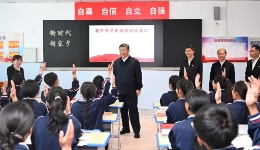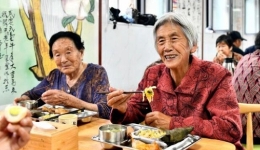Original title: After ten years of creation, Japanese director Takeuchi recorded the development steps of modern China through the "foreign eyes" (quotation)
Farewell to the Yangtze River: Shooting Changes in Chinese Capillaries (Theme)
Jiefang Daily reporter Zhong Han
Ten years ago, when he wrote A Journey to the World of the Yangtze River, Japanese director Takeuchi left a regret because he failed to shoot the "first drop of water at the source of the Yangtze River". After moving to Nanjing, China, he had deep feelings for this land and people, and was determined to make up for this regret and embark on the Yangtze River journey again. A documentary film "Farewell to the Yangtze River", which took ten years to shoot and traveled more than 6300 kilometers twice across the Yangtze River, was held in Shanghai the day before yesterday, and was shown across the country today.
Before the roadshow, Zhu Neiliang received an exclusive interview with our reporter. "Like many foreign audiences, I am interested in China today, and I shoot stories about people who are grounded," said Zhu Neiliang.
Photograph the Yangtze River to the world
"I'm going to work." When the reporter came in, Takeuchi Liang, who was chatting with his friends, put down his iced latte and sat on the sofa casually. His fluent Mandarin made people forget that he was Japanese. It is hard to imagine that when he first came to China to take photos of the Yangtze River 10 years ago, he could not speak Chinese. When communicating with photographers, he relied on gestures.
However, even though this "Chinese son-in-law" is already familiar with Chinese expressions, the Yangtze River in his lens still gives Chinese audiences a fresh feeling. "I shoot according to my own interests". Zhu Neiliang has seen Chinese documentaries such as "Talking about the Yangtze River" and "Talking about the Yangtze River", and found that the perspective of these films is relatively macro, telling the history and culture of the Yangtze River for thousands of years, citing ancient poems and literary works, but these grand points and national feelings are difficult for foreign audiences to understand. "Like many foreign audiences, I am interested in China today. I like ordinary people, like to watch stories by the river, and wonder what kind of people live by the river. There is no history and poetry in my films, and what I shoot are stories of ordinary people who are grounded," said Zhu Neiliang.
The modern Yangtze River photographed for the world is the special feature of Farewell to the Yangtze River. The Japanese are no strangers to the Yangtze River. The Japanese writer Ryunosuke Akutagawa wrote about the style and features along the Yangtze River in his Travels to China. In "Farewell to the Yangtze River", the Three Kingdoms may be the only Chinese history mentioned. During the shooting process, Takeuchi went to the Yellow Crane Tower and Chibi in Wuhan to "punch in", because this is the place mentioned in "Three Kingdoms". "Like many Japanese, I am also a super fan of" Three Kingdoms ". When the camera zooms over Baidi City in Qutang Gorge, Takeuchi Liang remembers the story of Liu Bei, the founding emperor of Shu Han, who was holding an orphan, rather than the well-known song "Early Departure from Baidi City", which few Japanese audiences know about Li Bai.
"Farewell to the Yangtze River" was released in Japanese cinemas on April 12. It not only topped the list of literary and artistic films, but also attracted many Japanese fans to the cinema with warm images that transcended language and cultural differences. "It was an accident that the film was first shown in Japan. I wanted to show it in China first." Takeuchi said that during the road show in Japan, many audiences expressed their desire to take the Three Gorges cruise ship in the film, or go to Shangri La to stay at the home stay in Zim. Later, many people really went there. "The people who come to the cinema to watch my films are basically people who like Chinese culture. They were previously depressed by the epidemic and their desire to travel to China was inspired by the film."
The recognition of a more modern and real China through film works has promoted the cultural exchange between China and Japan, which is an important cultural influence and significance of Farewell to the Yangtze River. However, in Takeuchi's view, "coming to China" is not the purpose of shooting. "I am not a member of the tourism company, nor do I shoot a promotional film. My goal is just to get to know each other. Not only do I let the Japanese know about China, but also through my works let the Chinese know how the Japanese view their mother river." He said frankly that there are many false reports and negative voices about China in the Japanese and western media today. In this case, "Of course, it's good to come. If you don't want to come, it's OK to understand first, or at least get rid of prejudice. It's OK to convey the real China I see to them.".
"Great changes" of two trips to the Yangtze River
As a Japanese director who has lived in China for many years, Takeuchi Liang's lens not only captures the magnificent scenery of the Yangtze River, but also reflects the real life and moving stories of the people along the coast. With a strong sense of life and the true feelings that reach the hearts of the people, Takeuchi presents to the world a panoramic China that is both magnificent and flowing.
"When shooting 10 years ago, the water in the Yangtze River was very dirty and smelly. In particular, there were many factories in the lower reaches of the river, and the waste water flowed directly. Now it is different. The water in the river has become clean, and after the launch of the Yangtze River's 10-year fishing ban plan, there are many fish in the water, and you can also see finless porpoises." Different feelings about the two trips to the Yangtze River, Zhuneiliang thought for a moment and then gave two words - "great change". "China is like a perpetual motion machine, always running forward with full power."
"Farewell to the Yangtze River" takes the Yangtze River as a clue to record the life changes of more than 400 million residents along the coast. Zhu Neiliang has passed through Nanjing, Shanghai, Chongqing, Yunnan, Sichuan and other provinces and cities, recording the groups of boat drivers, Chongqing Bangbang, reservoir migrants and others on the river. The images taken in 2011 and ten years later are interspersed and compared, from which we can intuitively feel that the environment of the Yangtze River basin has become cleaner, residents' houses have become more spacious and dignified, and people's lives have become more prosperous and happy.
As the documentary director Fan Lixin said, Zhu Neiliang was concerned about "the changes in China's capillaries in the past ten years". He stood in front of the camera, crossed the boundaries of creation, and really integrated into the real story.
Zhu Neiliang is affectionately called "Uncle Liang" by Chinese audiences, which makes him feel warm, and his shooting style has always been "no script". He said that this way allows him to record everything in front of him more realistically, rather than being restricted by the preset script. Before shooting, he will make a lot of preparations, including understanding the history and culture of the shooting site, and communicating with local people as much as possible to better capture their true stories.
When they went to Shangri La to shoot in 2011, Zhu Neiliang and his party met a Tibetan girl Ren Qingsim who held a lamb and took a group photo with tourists in the scenic spot. This 17-year-old girl who seemed to live in a "different world" did not understand how to drive a plane on the "road", and could not imagine what a 100 storey building would be like. In order to help Sim see a bigger world, Zhuneiliang resolutely took Sim and her mother on a trip to Shanghai, which changed her life. Ten years later, when visiting the old place again, Zm has become a capable owner of home stay. What's more surprising to Takeuchi Liang is that when she accepted her parents' "arranged marriage", her sister, who is 6 years younger than her and is going to college, now like a city girl, complains that "marriage is very tiresome and she doesn't want to think about it", and her parents acquiesce in her behavior.
What is the relationship between the change of the marriage view of two sisters in an ordinary family and the Yangtze River? "It may have nothing to do with the Yangtze River, but it has a lot to do with the changes in China". In Zhu Neiliang's opinion, the environment has changed greatly in the past decade, but the greater change comes from people's thinking. "China is too big to describe, and the changes in the thinking of Chinese youth are also difficult to generalize. By photographing this river that runs through China, we can cover urban, rural, ethnic minorities, nature and other diverse themes, and show the diverse culture of the whole China. This is also the biggest reason why I chose to shoot the Yangtze River.
The day before yesterday, Sim also came to the Shanghai roadshow site from Shangri La. This is when she came to Shanghai again after 13 years. Facing the audience in the hall of thousands of people, Zim cried excitedly.
"Some people told me that as a documentary director, we should not interfere in other people's lives, just from the perspective of onlookers. But I think the shooting itself has constituted interference, so we should go further and stick to it." Takeuchi believes that even if he is not himself, others will take him out of the plateau to go farther - because, The pace of great changes in China is irreversible.
Create the brand of "Farewell to the Yangtze River"
The day before yesterday, before entering the cinema, many audiences who participated in the 1000 person movie watching activity had seen the 9.3 point version of Douban's "Farewell to the Yangtze River" at station B. Zhu Neiliang was dressed in a casual suit with grey green plaid, and the white short sleeved shirt inside said "Farewell to the Yangtze River Theater". He ran around the huge hall to pass the microphone, and the atmosphere of on-site communication was very warm. In Farewell to the Yangtze River, Abeli, a Chinese Japanese mixed blood actor with the stage name of "Dongdong", and Zmu's deep feelings made Takeuchi Liang "jealous" and created many laughs. During the road show communication, sometimes the audience "unkindly" shouted out the name "Dongdong", just like painting the bullet screen at station B, relaxed and humorous. Takeuchi always responds appropriately to these obstacles, and he clearly knows how to spread online short videos.
It is also a bold challenge for "Farewell to the Yangtze River" in the field of documentary film to do online drama first and then go to the cinema. "Generally, this is not the way to do it, because the whole play is thorough. If you have seen the online version, you will find that many scenes are repeated, but the film version is different in story composition and lens selection, and there are many new contents." Zhu Neiliang introduced that "Farewell to the Yangtze River" was shot for the cinema line, and the online version was first made to explore new ways of communication. "I always think that the reason why documentary film has a small market is that there is no brand, no IP, no star, no one knows what the film is about, so it is difficult to attract audiences, and no one is willing to invest in cooperation. So, I first put" Farewell to the Yangtze River " The brand has been created to give people more opportunities to understand it. People who have seen the online version will want to go to the cinema again if they like it. "
The Shanghai 1000 People Film Festival attracted many documentary practitioners. At the roadshow site, Takeuchi Liang was asked some professional questions from time to time, such as "How to attract audiences to watch documentaries without popularity?" Facing his peers, he generously shared his secret, "First make online videos, many people first brush the short video clips of Zym, and then watch the whole film when attracted. You can also consider starting with short videos".
In addition to the film, "Farewell to the Yangtze River" also cooperates with the Yangtze River Publishing House to publish a book of the same name, telling stories in the film in words, which is also a part of building a documentary brand. At the roadshow scene, Takeuchi Liang lost no time in bringing goods for book pre-sales, and also helped the audience strive for "welfare" of cultural tourism. "Today's audience can come to the home stay in Zim for discount by virtue of the film ticket stub, and welcome everyone to travel to the beautiful Shangri La." However, the most important thing is the film. He said frankly: "I hope you can take friends to brush. Whether I can have a second or a third film depends on the box office of the first one. "
To do so much extra work lies in his deep understanding of the plight of documentaries in the film market. Although there are many materials to shoot, "Farewell to the Yangtze River" focuses on the stories of the middle and upper reaches of the Yangtze River. This is because the audience who like documentaries are mainly from first-line cities. They are more interested in the upper reaches, and the same is true in Japan. What impressed Zhuneiliang most was his experience of shooting the "first drop of water" on the Qinghai Tibet Plateau. He said that there are usually trees where there is water, but there is no green in the Qinghai Tibet Plateau at an altitude of 5000 meters, only water and soil. This magnificent scenery is impossible to see in Japan, which attracted him to explore constantly. The valuable material left by this hard shooting trip became the highlight at the end of the film.
What will be taken next? During the Chinese roadshow, many northern audiences told Zhu Neiliang, "Can we shoot the Yellow River? The Yellow River is also our mother river". "I have never seen the Yellow River. If I shoot it, it may be called" Hello, the Yellow River "or" Meet the Yellow River for the First Time "." Unlike the Yangtze River, Takeuchi Liang, a Japanese, does not understand this river that has bred the culture of the Central Plains. But after the Chinese audience repeatedly "brainwashed", he gradually felt that the subject matter was quite good, and slowly and truly began to have a shooting plan. "I like to create with fans."
"Farewell to the Yangtze River" is jointly produced by Jiangsu Film Group Co., Ltd., Nanjing Hezhimeng Cultural Communication Co., Ltd., Zhangjiagang Jinnonglian Cultural Development Partnership (limited partnership) and Huaxia Film Distribution Co., Ltd., and issued by Huaxia Film Distribution Co., Ltd. Next, "Farewell to the Yangtze River" will also carry out more road shows throughout the country, so that more audiences can enjoy this documentary full of true feelings, and feel the development pace of modern China in the "foreign eyes" of Japanese directors.


















